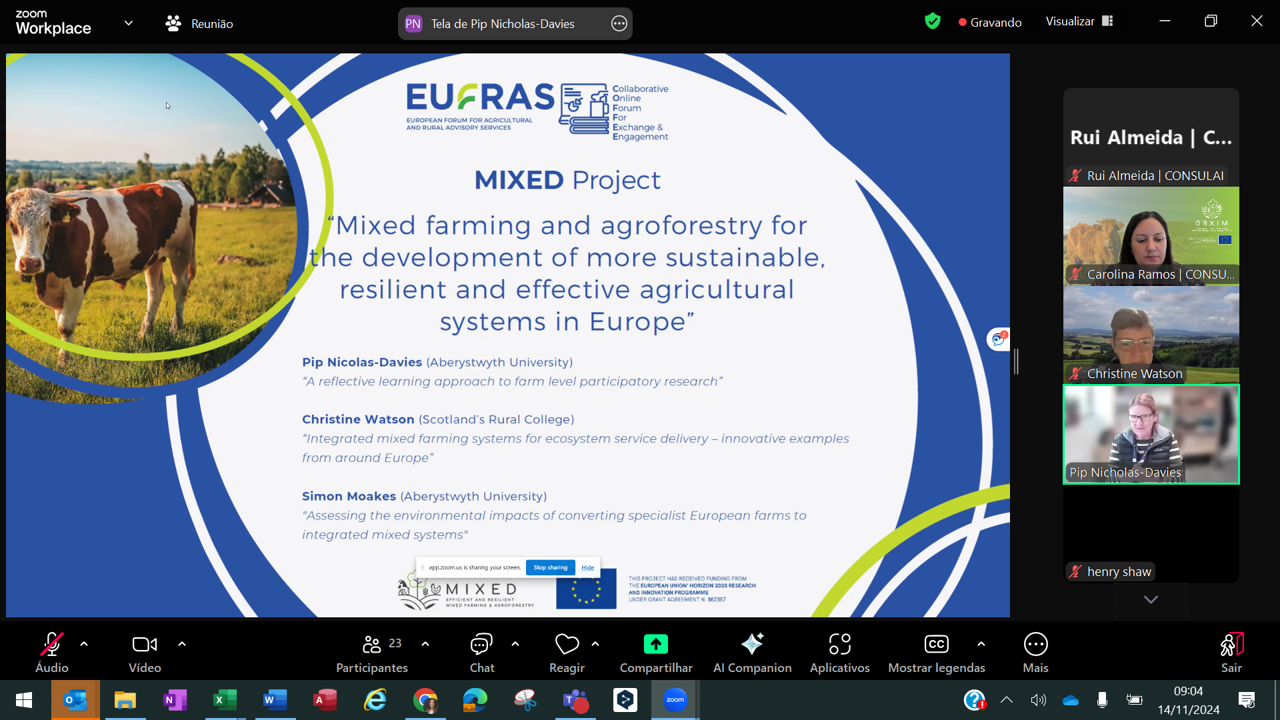The MIXED project shares insights at EUFRAS Coffee Break Session
The MIXED project was delighted to participate in the latest EUFRAS Coffee Break session, held on November 14th, 2024.

This monthly online event, hosted by the European Forum for Agricultural and Rural Advisory Services (EUFRAS), provided an excellent platform to share and discuss innovations in mixed farming and agroforestry systems. The session brought together a diverse audience of agricultural advisors, farmers, researchers, and stakeholders, fostering a meaningful exchange of ideas and experiences.
The Coffee Break session focused on the efficiency and resilience of mixed farming systems, key themes of the MIXED project. Expert speakers from the project, including Pip Nicolas-Davies (Aberystwyth University), Christine Watson (Scotland’s Rural College), and Simon Moakes (Aberystwyth University), presented the project's latest findings and highlighted practical solutions to challenges faced by farmers adopting mixed farming practices.
The session covered various aspects of the MIXED project, including:
- The Role of Mixed Farming and Agroforestry: Discussions centred on the benefits of integrating crops, livestock, and trees to enhance sustainability, biodiversity, and farm productivity.
- Practical Examples and Case Studies: The speakers shared real-world examples from the project’s 10-country network, showcasing how mixed farming systems can be tailored to diverse agricultural contexts.
- Knowledge Exchange: Participants engaged in a lively Q&A, exchanging ideas on how to overcome practical barriers and scale up these sustainable practices.
Key Highlights from the Session
The event featured three impactful presentations that explored the diverse aspects of mixed farming systems.
1. Pip Nicholas-Davies: Participatory Learning Hubs for Transitioning to MiFAS
Dr. Pip Nicholas-Davies from Aberystwyth University provided an overview of the participatory learning methodology implemented in the MIXED project. This approach prioritizes collaboration between researchers and farmers, enabling the co-creation of solutions to key challenges in mixed farming.
One of the highlighted examples was a collaboration in Scotland where arable and livestock farmers worked together to assess the benefits of winter grazing with sheep on cover crops. Challenges related to soil structure, fertility, and GHG quantification were identified, with follow-up trials planned for further learning. This reflective process underscores the importance of shared experiences and iterative improvements in agricultural practices.
2. Christine Watson: Defining ‘Mixedness’ and Evaluating Farm-Level Impacts
Christine Watson from SRUC (Scotland’s Rural College) discussed the concept of ‘mixedness’ and how it influences the environmental and economic impacts of mixed farming systems. Using real-world farm data, her team analyzed varying degrees of integration between livestock and crops and their implications for sustainability.
The results highlighted that greater integration often leads to improved nitrogen use efficiency and reduced reliance on external inputs. However, the extent of these benefits depends on the specific changes made by farmers and the socio-technical context of their operations. This nuanced perspective calls for tailored strategies when transitioning farms toward greater mixedness.
3. Simon Moakes: Modelling Transitions to MiFAS Using FarmLCA
Simon Moakes from Aberystwyth University showcased the use of the FarmLCA modelling tool to simulate transitions from specialized to mixed farming systems. The model incorporates multiple products, such as grazing under fruit trees and winter cereal grazing, allowing for flexible system design and assessment.
The tool’s application to case studies in Scotland, Germany, Poland, and France demonstrated that adopting MiFAS can reduce environmental impacts like GHG emissions and fossil energy use while maintaining or improving productivity. However, the success of these transitions often hinges on balancing livestock numbers and optimizing resource use.
Lessons Learned
The session highlighted the critical role of collaboration and innovation in fostering sustainable farming practices. Key takeaways include:
- The importance of participatory approaches for co-creating tailored solutions.
- The need for robust modelling tools to support decision-making and policy design.
- Mixed farming systems' potential to balance productivity, environmental stewardship, and economic viability.
One of the key takeaways was the emphasis on collaboration and learning, highlighting the importance of knowledge sharing between farmers, researchers, and advisors in developing effective solutions for mixed systems.
(re)Watch the event
Missed the event? You can watch the full EUFRAS Coffee Break session with MIXED project on YouTube:
The MIXED project team expressed gratitude to EUFRAS for providing a platform to disseminate these findings and engage with stakeholders committed to sustainable agriculture.
The MIXED project continues to collaborate with its partners across Europe to drive innovation in mixed farming and agroforestry. Events like the EUFRAS Coffee Break play a crucial role in promoting sustainable farming practices and encouraging dialogue among key stakeholders.
Stay tuned for more updates from MIXED as we work towards building resilient and efficient agricultural systems for the future.
